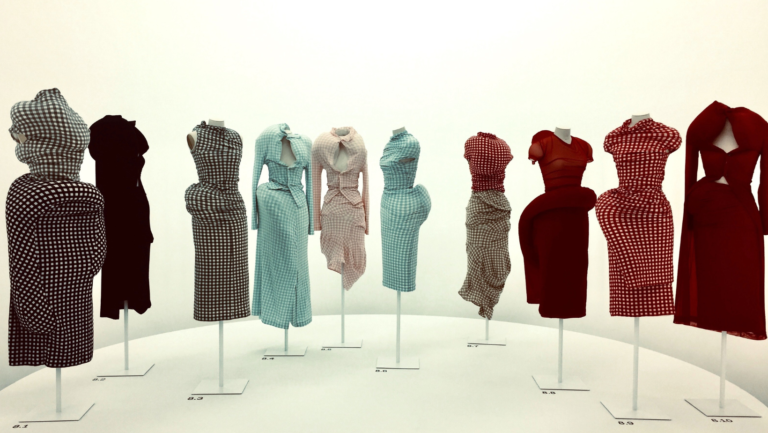Join our Newsletter receive 🎁
Is it worth studying fashion? The pros and cons of an education in the industry

When considering a career in fashion, many people face a dilemma: is it worth investing time and resources in a degree course, or is it better to focus on gaining practical experience? This decision depends on individual goals, aspirations and available resources.
Contents of the article
- Overview of available degree courses in Poland and abroad
- Poland:
- International:
- Alternative career paths
- Pros and cons of traditional fashion education
- Does studying help you find a job in the industry?
- My experiences
- Questions to ask yourself before deciding to study:
- What are my career goals in the fashion industry?
- Ranking of selected fashion business-related universities:
- London College of Fashion (London, United Kingdom)
- Fashion Institute of Technology (FIT) (New York, USA)
- Polimoda (Florence, Italy)
- Institut Français de la Mode (Paris, France)
- ESMOD (Paris, France / Berlin, Germany)
- What majors outside of fashion make it possible to work in this industry?
- Marketing and management
- Journalism and communication
- Supply chain management and logistics
- Computer graphics and UX/UI design
- Economics and finance
- Is it worth studying fashion?
Overview of available degree courses in Poland and abroad
Poland:
In Poland, the educational offer in fashion is constantly growing. Universities such as the Academy of Fine Arts in Warsaw or Łódź offer courses in fashion design and fashion accessories. These programmes combine design, art, humanities and technical subjects, enabling students to gain a comprehensive knowledge.
For those interested in the business side of fashion, Lazarski University in Warsaw offers postgraduate studies in “Law and Management in the Fashion Sector”, which are adapted to the dynamically changing market.
International:
There are many reputable universities abroad offering fashion-related degrees. Here are a few of them:
- London College of Fashion (London, UK): Known for its wide range of courses, from design to fashion management.
- Fashion Institute of Technology (FIT) (New York, USA): A university with a strong emphasis on combining theory and practice, known for educating many well-known designers.
- Central Saint Martins (London, UK): A university with an impressive alumni list, offering degrees in fashion design, communication and theory.
Alternative career paths
Not everyone opts for traditional fashion studies. Here are some alternative paths:
- Courses and workshops: Many institutions offer short-term courses in the field of design, styling or fashion marketing.
- Internships and traineeships: Direct work in the industry allows you to gain valuable experience and establish contacts.
- Networking: Attending industry events, trade shows, or fashion shows can open the door to many professional opportunities.
Pros and cons of traditional fashion education
Pros:
- Structured learning: study programmes offer structured knowledge and access to learning resources.
- Networking opportunities: Universities often organise industry events, enabling networking.
- Access to equipment and technology: Students have the opportunity to use modern labs and tools.
Cons:
- Costs: Studying, especially abroad, can be expensive.
- Duration: Study programmes typically last several years, which can delay entry into the labour market.
- No guarantee of employment: A diploma does not always translate into immediate employment in the industry.
Does studying help you find a job in the industry?
Having a degree from a reputable university can increase your chances of being hired, but it is not the only determining factor. Employers value practical skills, experience and passion above all. It is therefore worth combining education with practice, participating in internships and building up a portfolio.
My experiences
I personally completed a Fashion Buying Management course at the University of Westminster in London. These studies provided me not only with theoretical knowledge, but also practical skills and valuable contacts in the industry. However, in hindsight, I can see that the experiences gained outside the walls of the university were just as important.
Questions to ask yourself before deciding to study:
What are my career goals in the fashion industry?
- Do I prefer to learn in an academic structure or through practical experience?
- Am I willing/ready to invest time and resources in my studies?
- What are the alternative paths to achieving my goals?
- Do I already have skills that I can develop without formal education?
Ranking of selected fashion business-related universities:
London College of Fashion (London, United Kingdom)
It offers a wide range of courses related to the business of fashion, from management to marketing. This university places a strong emphasis on practical experience and working with brands.
Fashion Institute of Technology (FIT) (New York, USA)
Known for its strong programmes in fashion marketing, brand management and merchandising. FIT is a university with great networking opportunities, proximity to the global fashion market and internships with top designers.
Polimoda (Florence, Italy)
One of the best schools in Europe for fashion management and business strategies for luxury brands. Offers an innovative approach to learning, combining theory with intensive workshops.
Institut Français de la Mode (Paris, France)
The ideal place for those who want to gain knowledge of the French and European fashion market. IFM works with brands such as Louis Vuitton, Dior and Balenciaga.
ESMOD (Paris, France / Berlin, Germany)
A university with over 180 years of tradition that combines design education with fashion business knowledge. For those interested in building their own brand or working in fashion marketing.
What majors outside of fashion make it possible to work in this industry?
Not everyone who wants to work in fashion needs to study a strictly fashion-related degree. Many people find jobs in fashion with degrees in other fields. Here are some examples:
Marketing and management
Jobs in fashion are not limited to design - many brands need marketing, PR and sales strategy specialists.
Graduates of courses such as “Marketing”, “Management” or “E-commerce” often find themselves in the communications departments of fashion brands.
Journalism and communication
Studying journalism and PR opens the door to working in fashion media such as Vogue, Elle or Business of Fashion.
Many people working in fashion started out as editors, copywriters or content specialists.
Supply chain management and logistics
Fashion is a business that requires efficient logistics and production management. Supply chain management majors are valued in large fashion companies.
Computer graphics and UX/UI design
E-commerce and digital fashion are growing rapidly, so brands are increasingly hiring graphic designers, web designers and UX/UI specialists.
Economics and finance
Working in fashion also involves managing budgets, market analysis and financial strategy. Brands need finance experts to help them grow their business.
Is it worth studying fashion?
There is no single right path to a career in fashion. Studying can give you a solid theoretical foundation, access to contacts and the opportunity to work on your first projects, but it does not guarantee success.
If you are looking to gain comprehensive knowledge, studying at a reputable university can be a great choice. However, if you want to get into the market quickly and gain practical experience, alternative paths such as courses, internships and networking are worth considering.
The most important thing is to define your own goals and find the path that best suits your ambitions. Fashion is an industry full of opportunities and success depends on a combination of knowledge, experience and consistency.

Subscribe to Fashion Editorial and stay up to date with the world of fashion!
Get the latest news from the world of fashion - trend analysis, exclusive reports and alerts on key industry events.
🎁 Gift for subscribers!.
No spam, only valuable content! We do not share your data with third parties. By subscribing, you agree with our Privacy Policy.






Add your first comment to this post